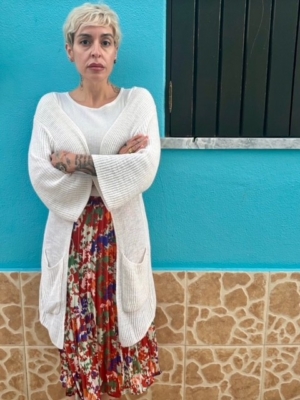No Beco dos Ramos: Alfama and Queer Love as Resistance
[creative non-fiction]
In the summer of 2018, my then-wife and I spent a weekend in the beautiful “village” of Alfama. We rented what I can only describe as a cavern of a studio in what would become my most favorite part of the city. The apartamento was ridiculously small, with only one window and a bed pushed into a cave-like opening against the wall. It was tight and hot and absolutely perfect.
Alfama was especially meaningful to me as a queer Luso-American. This enchanting area of Lisbon has been home to everyone from the Moors to Jews, fishermen and fruit vendors, the poor, prostitutes, addicts, dealers, immigrants and artists alike. Alfama, as one of the oldest quarters that survived the great earthquake of 1755, has been a site for the marginalized, disenfranchised, and persecuted; as a tattooed, neurodiverse lesbian daughter of immigrants, I felt right at home.
Alfama, or Al-Ḥammah in Arabic, means “hot spring.” And our experience there as newlyweds certainly was. We thoroughly enjoyed the warmth of walking the alleyways, gushing over the prolific street art, fawning over the clothes on the lines and the swallows scavenging crumbs on the cobblestone. But the most perfect moment in Alfama happened in our little corner no Beco dos Ramos.
Steamy, slippery love: two female bodies wounded by unforgiving family and compulsory heterosexuality intertwined like bougainvillea in the musk of August, moved to the tempo of German tourists’ steps outside the window, heart beats— a fado carried all the way around the corner. We filled that afternoon up with so much light I am sure it radiated outwards, covered all of Lisbon com a luz that only queer love holds.
Hence, our tiny studio was where we most actively resisted the cis-heteronormative ideology held by most Portuguese folks and used against us as “viable” Portuguese-American women. We were out in public as a queer couple, but our gayness truly triumphed in our little cloister. We were Portuguese AND queer and, in this place, both identities were inseparable and true. In Alfama, we were an act of resistance that, although private, marked a moment in my history when I felt loved and seen, and most importantly, enough. Who could have known that years later, we would be divorced, happily partnered, and good friends, remembering the little home that held us—two daughters of Portuguese immigrants longing for the unconditional acceptance our people so haughtily, cruelly, and continuously keep from us.
Standing in this alley again in 2024, with a new song and a new love, my gratitude outweighs my grief. I am reminded of the great Pessoa saying from O Livro do Desassossego: “There are ships sailing to many ports, but not a single one goes where life is not painful.” No Beco dos Ramos, I cried for the then, for the now, and for all the saudade and sorte in between.
Marina Carreira (she/they) is a queer Luso-American poet and artist from Newark, NJ. A Pushcart Prize nominee and 2024 Luso-American fellow in the DISQUIET Literary Program, Carreira is the author of Desgracada (Bottlecap Press, 2023), Tanto Tanto (Cavankerry Press, 2022), Save the Bathwater (Get Fresh Books, 2018), and I Sing To That Bird Knowing He Won’t Sing Back (Finishing Line Press, 2017). She has exhibited her art at the Newark Museum, Morris Museum, ArtFront Galleries, and Monmouth University Center for the Arts, among others. Carreira works in higher education and teaches Women and Gender Studies at Kean University. Find her on Instagram at @savethebathwater.





